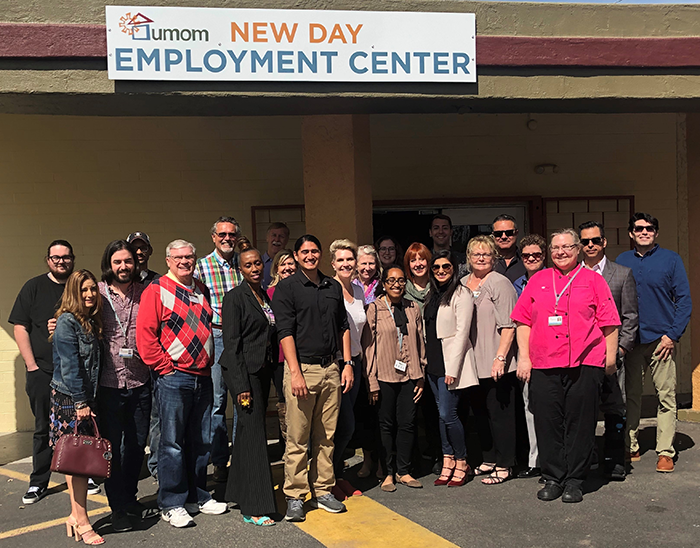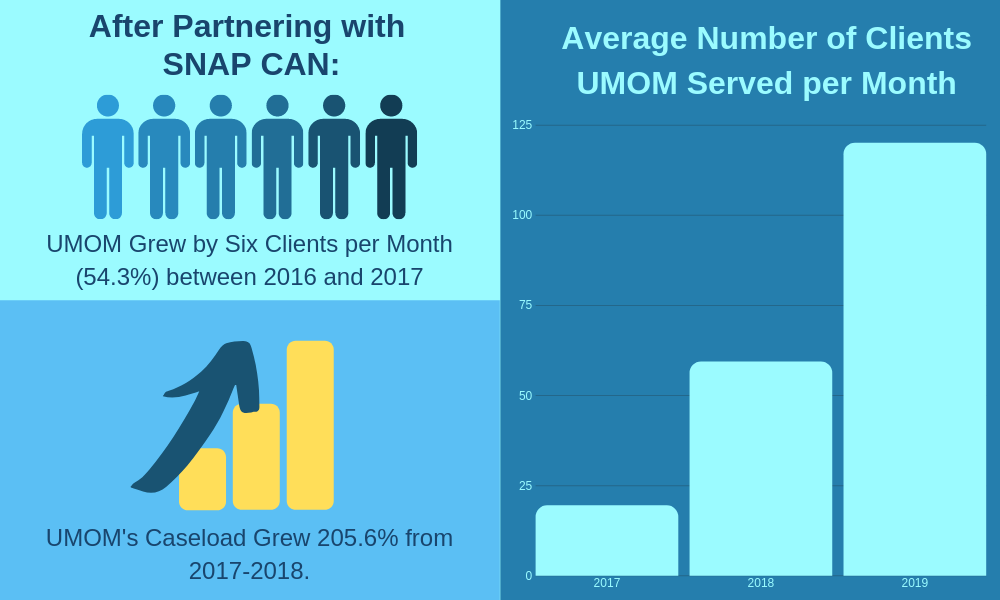SNAP CAN Provides Financial Benefits for Community-Serving Nonprofit

UMOM team in front of the Employment Center. Daniel Davis in front, second from left. (Photo credit Daniel Davis)
The Supplemental Nutrition Assistance Program Career Advancement Network (SNAP CAN) is a federal, state and local partnership designed to help Supplemental Nutrition Assistance Employment and Training (SNA E&T) participants overcome barriers and find employment.
Organizations — both public and nonprofit — which offer approved employment and training services to SNAP recipients are also eligible to become a SNAP CAN partner and receive access to federal reimbursement dollars for services they are already providing.
One SNAP CAN program that has had great success and seen exponential growth is United Methodist Outreach Ministries (UMOM). UMOM has been a SNAP CAN partner for nearly four years. Not only does UMOM provide widely renowned blueberry muffins at its Helpings Café — a place that helps fund programs and delivers employment experience in the food industry — it also assists people experiencing homelessness with living assistance and tools for the workforce.
Daniel Davis is the Workforce Development Manager at UMOM. He said that before UMOM partnered with SNAP CAN, its employment services were limited due to funding, so clients would have to choose which part of the program (like transportation, job readiness, job retention, education) in which to participate. Most of their decisions were based on scarcity and availability.
After becoming a SNAP CAN Partner, UMOM has expanded its reach to serve more individuals in need of employment assistance.
“Since joining SNA E&T as a partner, SNAP CAN has become the largest single source of funding for UMOM’s Workforce Department,” Davis said. “It has proven invaluable due to its flexibility; allowing our program to dictate how employment services should be administered.”
Per its latest projections, UMOM predicts SNAP CAN will fund 50% of the workforce program for fiscal year 2019-2020.
“Due to the breadth and continuity of supportive services offered to participants in SNAP CAN, UMOM can help participants in job readiness one month, then provide follow-up support for job retention the next month, and even pay supportive costs for participants to pursue their GED the following month,” said Davis.
According to data collected by DES SNAP CAN coordinator, Krystal Magata, UMOM’s outreach was able to connect with many additional people needing services:
Client Load
- From 2016-2017, client load increased from 12.5 per month to an estimated 19.42 per month, which equates to 54.3% total growth.
- From 2017-2018, the client load increased to 59.34 per month, marking an estimated 205.6% growth.

“So, from the SNAP CAN dollars, they have been able to grow their capacity every year, and now this year, they’re already trending around 120 clients per month,” Magata said.
UMOM isn’t the only organization partnered with the SNAP CAN program seeing exponential growth. There are over a dozen other partnerships, and they all have a similar flow.
“The first year they’re really building that infrastructure for making sure that the programs they have are solid; they’re making sure they have the staff that they need,” Magata said. “And then that second to third year is where we see a huge jump in their capacity of adding more individuals.”
With its SNAP CAN partnership, UMOM has grown considerably, and is now able to provide more assistance to the community members who need it.
“SNAP CAN has been an incredible opportunity for UMOM to provide comprehensive support to our participants,” Davis said.
For prospective partners, the process isn’t hard. A quick, 11-question assessment about the organization is requested, and once completed, a SNAP CAN team member will follow up shortly.
For more information about SNAP CAN, please visit the SNAP CAN webpage.

Inside UMOM’s Employment Center.(Photo credit Daniel Davis)

